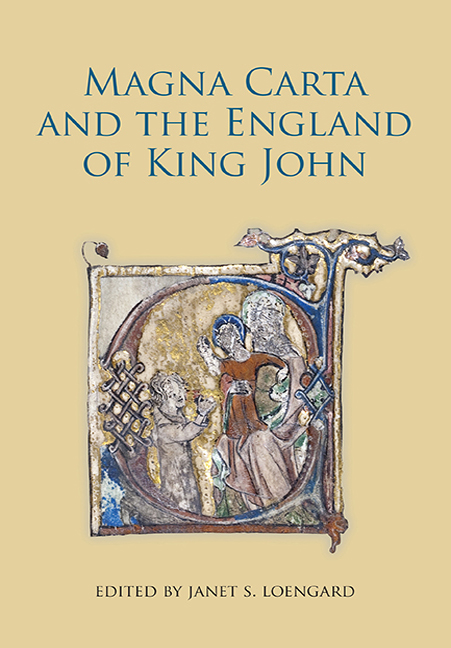Book contents
- Frontmatter
- Contents
- List of Contributors
- List of Abbreviations
- Introduction
- England in 1215: An Authoritarian Angevin Dynasty Facing Multiple Threats
- The Anonymous of Béthune, King John and Magna Carta
- Baronial Paranoia in King John's Reign
- The Forest Eyre in the Reign of King John
- The Managerial Revolution in the English Church
- Magna Carta, the ius commune, and English Common Law
- Justice without Judgment: Criminal Prosecution before Magna Carta
- What Did Magna Carta Mean to Widows?
- The English Economy in the Age of Magna Carta
- The Complaint of King John against William de Briouze (c. September 1210)
- Index
Magna Carta, the ius commune, and English Common Law
Published online by Cambridge University Press: 28 April 2017
- Frontmatter
- Contents
- List of Contributors
- List of Abbreviations
- Introduction
- England in 1215: An Authoritarian Angevin Dynasty Facing Multiple Threats
- The Anonymous of Béthune, King John and Magna Carta
- Baronial Paranoia in King John's Reign
- The Forest Eyre in the Reign of King John
- The Managerial Revolution in the English Church
- Magna Carta, the ius commune, and English Common Law
- Justice without Judgment: Criminal Prosecution before Magna Carta
- What Did Magna Carta Mean to Widows?
- The English Economy in the Age of Magna Carta
- The Complaint of King John against William de Briouze (c. September 1210)
- Index
Summary
The importance of the Angevin period to the development of a characteristically English common law is widely recognized. Less well known, but also of considerable significance, was the Anglo-Norman contribution to the ius commune, the Roman and canon law studied and practised in Europe during this period. However, the question of influence from the ius commune to English common law remains very problematic. One method of tackling the issue is to take a single legally important text and investigate the possibility of ius commune influence upon it, or indeed the possibility of the continuing effect of some earlier influence of canon law upon English law. An obvious text for such examination is Magna Carta: how far was the legal background to the great charter purely English, how far was it that of broader developments in European learned law?
¶ State of the issue
The maximalist position concerning the influence of ius commune is best made by Professor Helmholz, in his article ‘Magna Carta and the ius commune’, published in the University of Chicago Law Review in 1999. The article makes the argument that the ius commune, the amalgam of the Roman and canon laws that governed legal education in European universities and influenced legal practice in Europe from the twelfth century forward, played a role in the drafting of a significant number of the Charter's provisions.
The contrary view is best presented in J. C. Holt's magisterial book, Magna Carta, first published in 1965 and reissued in 1992 with a substantial new chapter on ‘Justice and Jurisdiction’. Holt states that
the extent and quality of ecclesiastical influence on the Charter are not easy to determine. … Some clauses reveal an immediate canonical influence … However, canonical influence was sometimes narrower and ecclesiastical intervention more restricted than laymen would have liked. The clearest and most certain evidence on the attitude of Langton [the archbishop of Canterbury] and his colleagues is not to be found in the chronicles, or even in contemporary canon law, but in the Articles [of the Barons] and the Charter. In these they acted throughout with a proper regard for the distinctions between the spiritual and the temporal, refusing to permit secular interference in the former, and intruding themselves as little as possible into the latter.
- Type
- Chapter
- Information
- Magna Carta and the England of King John , pp. 99 - 119Publisher: Boydell & BrewerPrint publication year: 2010

